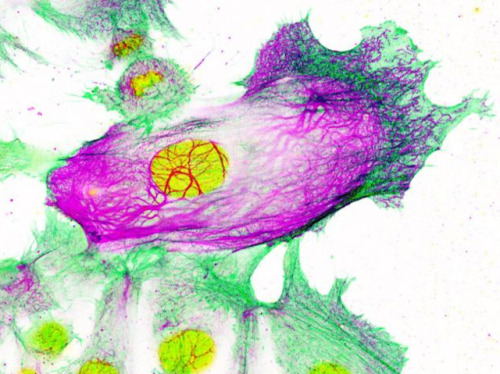
Hard as Nails
For the most common type of breast cancer, treatment often involves aromatase inhibitors (AIs), drugs which block oestrogen production. While initially effective, cancer can return, and when it does, the cancerous cells may be resistant to AIs, and may have spread by metastasis. Recent research suggests this could be because treatment with AIs causes epigenetic changes, modifications around DNA that alter how genes are transcribed, leading to an increase in keratin-80 (pictured, in purple, in an AI-resistant cancer cell surrounded by non-resistant cells, with cell nuclei in yellow). Related to keratins in hair and nails, this scaffolding protein makes cells stiffer, which could help them move and invade other tissues more easily during metastasis. While further studies are needed, these results suggest a link between resistance to AIs and increased metastatic potential, so targeting the resistance mechanism could be an effective route towards preventing future metastasis in breast cancer patients.
Written by Emmanuelle Briolat
- Image from the Department of Surgery and Cancer, Imperial College London, London, UK
- and the Division of Cancer Biology, Tumour Microenvironment Team, Institute of Cancer Research, London, UK
- Image copyright held by the original authors
- Research published in Nature Communications, May 2019
You can also follow BPoD on Instagram, Twitter and Facebook
Archive link




Комментариев нет:
Отправить комментарий